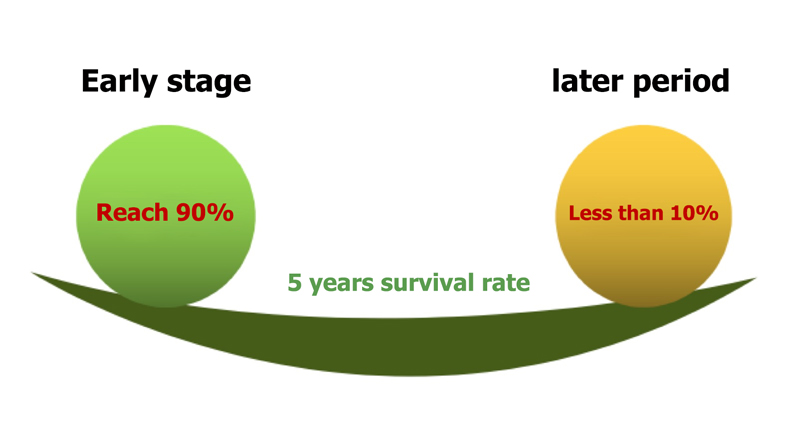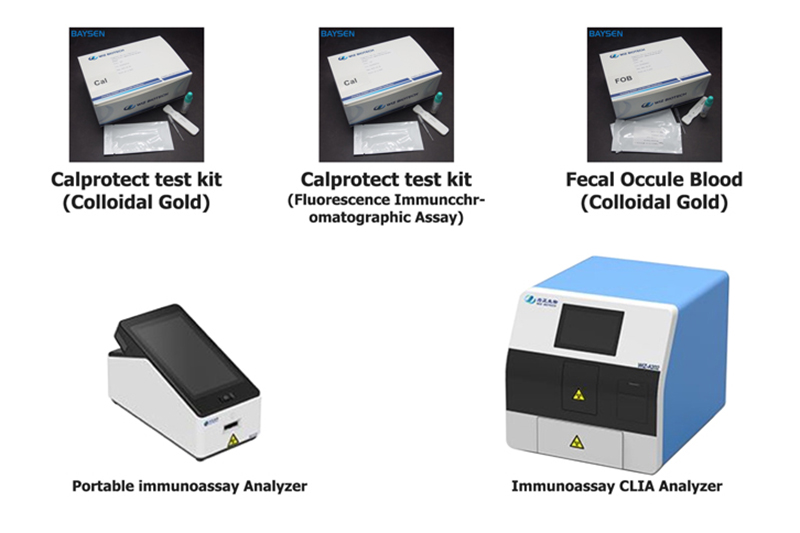Colorectal cancer
Colorectal cancer (CRC, including rectal cancer and colon cancer) is one of the common malignant tumors of the gastrointestinal tract.
China’s gastrointestinal cancer has become the “national first killer”, about 50% of gastrointestinal cancer patients occur in China, and 60% of the middle and late.
Regardless of the new case or mortality, the total number of gastrointestinal cancers has exceeded lung cancer. Intestinal cancer is the most easily cured of all cancers through early screening. It is the first bastion of human beings to overcome cancer. Only 5% of Chinese colorectal cancers were diagnosed early, and 60-70% of patients with colorectal cancer were found to have lymph nodes or distant metastases. The recurrence rate was as high as 30%.
Japan and South Korea are also countries with high incidence of gastrointestinal cancer, but their early diagnosis rate is 50-60%, and more than 90% of patients can be cured. Domestic and international research shows that colorectal cancer screening measures can reduce the incidence and mortality of colorectal cancer.
In recent years, in addition to Europe, North America, Japan, Singapore, South Korea, Taiwan, and Hong Kong, there have been government-led large-scale national screenings. Early screening for diagnosis of gastrointestinal cancer has the opportunity to be completely cured, with great social significance and market value.
The occurrence of colorectal cancer is a relatively long process. From polyps to abnormal hyperplasia to cancer, it usually takes a long time, which provides a time for the screening of colorectal cancer. Effective early screening and intervention treatment can reduce the incidence of cancer by 60% and the mortality rate by 80%.
2, Significance of calprotectin in intestinal function examination
Calprotectin is a calcium-zinc-binding protein derived from neutrophils and macrophages, with a molecular weight of 36,000, a heterodimer formed by the non-covalent association of two heavy chain MRP14 and one light chain MRP8, belonging to S100. Family protein.
Through extensive research literature and clinical verification, calprotectin has high sensitivity for detecting colorectal cancer and is not affected by tumor stage, which can be found in early and asymptomatic period. Can be used as a marker for colorectal cancer screening.
The sensitivity of fecal calprotectin, fecal occult blood test and serum CEA for colorectal cancer were 88.51%, 83.91% and 44.83%, respectively. The positive rate of fecal occult blood test and serum CEA in patients with stage D and stage A was significantly lower than that in patients with stage C and D. There was no significant difference in the positive rate of fecal calprotectin in patients with different stages of Dukes.
The sensitivity of fecal calprotectin diagnosis to rectal cancer reached 92.7%, and the negative predictive value of NPV reached 98.6%. Fecal calprotectin for colorectal cancer, ≥10mm colorectal polyps total negative predictive value NPV reached 97.2%.
Up to now, more than 20 countries such as the United States, Britain, Canada, France, Germany, and Switzerland have used calprotectin as an important indicator for screening inflammatory bowel disease and cancer in high-risk populations of intestinal diseases, and evaluated inflammatory bowel disease. Active and healing important signs are widely used in clinical practice.
3, Advantages of calprotectin and occult blood combined detection of intestinal cancer risk assessment
- Easy to operate: one sample, multiple test results
- Does not increase the difficulty of operation and the cost of the instrument: the instrument is placed, and the equipment is equipped according to the requirements.
- High sensitivity and specificity: inflammation index, gastrointestinal bleeding
- Early screening stage advance: increase the probability of screening for adenocarcinoma and polyps
- Low detection cost, can be used as drainage of colonoscopy
- Persistence: annual batch screening
Typical symptoms of colorectal cancer:
Intestinal inflammation – calprotectin, Dukes stage is the stage A and B patients with occult blood test and serum CEA positive rate is significantly lower than patients with C and D stage, Dukes different stages of the patient, the positive rate of fecal calprotectin Significant differences.
Gastrointestinal bleeding – occult blood, transferrin. Gastrointestinal hemorrhage refers to the loss of blood through the gastrointestinal tract for various reasons. Common causes include inflammation of the digestive tract itself, mechanical damage, vascular disease, tumor, and visceral diseases in the gastrointestinal tract. The occult blood test is a routine and important means of diagnosing gastrointestinal bleeding.
4, Method for detecting fecal calprotectin
Our calprotectin test kit (colloidal gold method) can be used alone to semi-quantitatively detect calprotectin in human stool samples. It can also be used with the WIZ series of immunoassays.
The calprotectin assay kit (fluorescence immunochromatography) can achieve quantitative detection, accurate numerical values, and wide linear range, so as to achieve the effect of distinguishing intestinal diseases.
The occult blood test kit (colloidal gold method) is used for qualitative detection of human hemoglobin in human feces, which is suitable for the diagnosis of gastrointestinal bleeding.
Post time: May-28-2019








